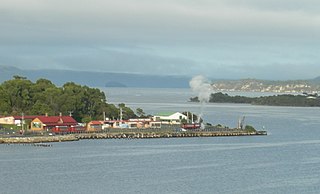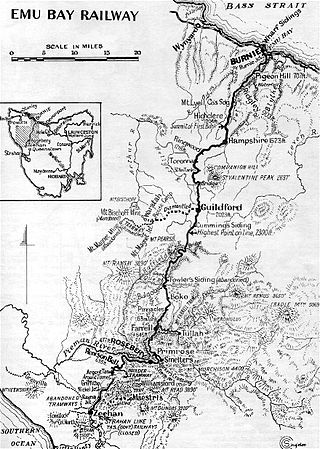Rosebery is a town on the west coast of Tasmania, Australia. It is at the northern end of the West Coast Range, in the shadow of Mount Black and adjacent to the Pieman River now Lake Pieman.

Regatta Point is the location of a port and rail terminus on Macquarie Harbour.

The Melba Line is a 1,067 mm narrow-gauge railway on the West Coast of Tasmania. The line was originally constructed as a private railway line named the Emu Bay Railway and was one of the longest-lasting and most successful private railway companies in Australia. While at present the line travels from Burnie to Melba Flats, it previously ran through to Zeehan carrying minerals and passengers as an essential service for the West Coast community.

The North East Dundas Tramway was a 2 ft narrow gauge tramway, that ran between Zeehan and Deep Lead on the West Coast of Tasmania. Opening in 1896 and closing in 1932, it was part of the Tasmanian Government Railways network. The world's first Garratt locomotives, the K class, were used on the line.
Mount Read is a mountain located in the West Coast region of Tasmania, Australia, and is at the north west edge of the West Coast Range.

The Lake Margaret Tram was located on the western side of Mount Sedgwick in the West Coast Range on the West Coast of Tasmania in service for the Mount Lyell Mining and Railway Company to the Lake Margaret community.
Comstock Tram refers to three different tramways in the West Coast Tasmania, Australia
The mines of the West Coast of Tasmania have a rich historical heritage as well as an important mineralogical value in containing or having had found, specimens of rare and unusual minerals. Also, the various mining fields have important roles in the understanding of the mineralization of the Mount Read Volcanics, and the occurrence of economic minerals.
The history of the Railways on the West Coast of Tasmania has fascinated enthusiasts from around the world, because of the combination of the harsh terrain in which the railways were created, and the unique nature of most of the lines.
The Strahan–Zeehan Railway, also known as the "Government Railway", was a railway from Strahan to Zeehan on the west coast of Tasmania.
The Montezuma Falls, a horsetail waterfall on a minor tributary to the Pieman River, is located on the West Coast Range of Tasmania, Australia.

Mount Murchison is a mountain on the West Coast Range, located in the West Coast region of Tasmania, Australia.

The Wee Georgie Wood Railway is a 2 ft narrow gauge tourist tramway running from Tullah, on a 1.9 km (1.2 mi) short track by the edge of Lake Rosebery in the West Coast Municipality of Tasmania.
Melba Flats is a railway siding on the Emu Bay Railway east of Zeehan that served as a terminus for trains carrying copper ore from the Mount Lyell Mining and Railway Company in west coast Tasmania, once the Emu Bay Railway ceased services into the Zeehan townsite.
The Mount Dundas – Zeehan Railway was a railway line running 7 miles (11 km) from Dundas to Zeehan on the West Coast of Tasmania. It operated from 1892 until 1932, and the rails were removed in 1940.

Dundas was a historical mining locality, mineral field and railway location on the western foothills of the West Coast Range in Western Tasmania. It is now part of the locality of Zeehan.

The Emu Bay Railway was a Tasmania, Australian railway company. The railway was significant during full operation, in that it linked the Tasmanian Government Railways system at Burnie with that at Zeehan that further linked to the Mount Lyell railway allowing connection through to Queenstown.

Zeehan railway station in Tasmania, was a major junction and railway yard for numerous different railway and tramway systems in western Tasmania in the town of Zeehan.

The Hercules Haulage, also known as the Mount Read Haulage, the Hercules Tram and the Williamsford Haulage Line, was a self-acting 2 ft narrow gauge tramway on the side of Mount Read in Western Tasmania, that connected the Hercules Mine with Williamsford and then to the North East Dundas Tramway.
Lou Rae is a Tasmanian author and historian of the West Coast of Tasmania.










